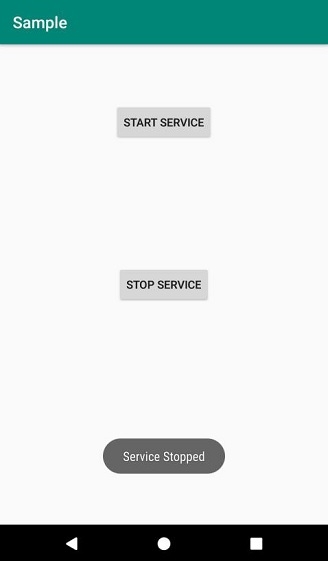Android 中 Activity 和 Service 之间的通信?
这个例子演示了如何在 android 中进行 Activity 和 Service 之间的通信。
步骤 1 − 在 Android Studio 中创建一个新项目,转到 文件 ⇒ 新项目并填写所有必需的详细信息以创建一个新项目。
步骤 2 − 将以下代码添加到 res/layout/activity_main.xml。
<?xml version="1.0" encoding="utf-8"?> <RelativeLayout xmlns:android="http://schemas.android.com/apk/res/android" xmlns:tools="http://schemas.android.com/tools" android:layout_width="match_parent" android:layout_height="match_parent" tools:context="MainActivity"> <Button android:id="@+id/buttonStart" android:layout_width="wrap_content" android:layout_height="wrap_content" android:layout_alignParentTop="true" android:layout_centerHorizontal="true" android:layout_marginTop="74dp" android:text="Start Service" /> <Button android:id="@+id/buttonStop" android:layout_width="wrap_content" android:layout_height="wrap_content" android:layout_centerHorizontal="true" android:layout_centerVertical="true" android:text="Stop Service" /> </RelativeLayout>
步骤 3 − 将以下代码添加到 src/MainActivity.java
import android.content.Intent;
import android.os.Bundle;
import android.view.View;
import android.widget.Button;
import android.support.v7.app.AppCompatActivity;
public class MainActivity extends AppCompatActivity implements View.OnClickListener {
Button buttonStart, buttonStop;
@Override
public void onCreate(Bundle savedInstanceState) {
super.onCreate(savedInstanceState);
setContentView(R.layout.activity_main);
buttonStart = findViewById(R.id.buttonStart);
buttonStop = findViewById(R.id.buttonStop);
buttonStart.setOnClickListener(this);
buttonStop.setOnClickListener(this);
}
public void onClick(View src) {
switch (src.getId()) {
case R.id.buttonStart:
startService(new Intent(this, MyService.class));
break;
case R.id.buttonStop:
stopService(new Intent(this, MyService.class));
break;
}
}
}步骤 4 - 创建一个新服务(MyService)并将以下代码添加到 MyServices.java
import android.app.Service;
import android.content.Intent;
import android.media.MediaPlayer;
import android.os.IBinder;
import android.support.annotation.Nullable;
import android.widget.Toast;
public class MyService extends Service {
MediaPlayer myPlayer;
@Nullable
@Override
public IBinder onBind(Intent intent) {
return null;
}
@Override
public void onCreate() {
Toast.makeText(this, "Service Created",
Toast.LENGTH_LONG).show();
myPlayer = MediaPlayer.create(this, R.raw.song);
myPlayer.setLooping(false);
}
@Override
public void onStart(Intent intent, int startId) {
Toast.makeText(this, "Service Started",
Toast.LENGTH_LONG).show();
myPlayer.start();
}
@Override
public void onDestroy() {
Toast.makeText(this, "Service Stopped",
Toast.LENGTH_LONG).show();
myPlayer.stop();
}
}步骤 5 − 将以下代码添加到 androidManifest.xml
<?xml version="1.0" encoding="utf-8"?> <manifest xmlns:android="http://schemas.android.com/apk/res/android" package="app.com.sample"> <application android:allowBackup="true" android:icon="@mipmap/ic_launcher" android:label="@string/app_name" android:roundIcon="@mipmap/ic_launcher_round" android:supportsRtl="true" android:theme="@style/AppTheme"> <service android:name=".MyService" android:enabled="true" android:exported="true"></service> <activity android:name=".MainActivity"> <intent-filter> <action android:name="android.intent.action.MAIN" /> <category android:name="android.intent.category.LAUNCHER" /> </intent-filter> </activity> </application> </manifest>
让我们尝试运行你的应用程序。我假设你已经将你的实际 Android 移动设备连接到了你的电脑。要从 android studio 运行应用程序,打开一个项目的活动文件并单击工具栏中的运行 图标 ![]() 。选择你的移动设备作为选项,然后查看你的移动设备,它会显示你的默认屏幕 -
。选择你的移动设备作为选项,然后查看你的移动设备,它会显示你的默认屏幕 -



广告

 数据结构
数据结构 网络
网络 RDBMS
RDBMS 操作系统
操作系统 Java
Java iOS
iOS HTML
HTML CSS
CSS Android
Android Python
Python C 编程
C 编程 C++
C++ C#
C# MongoDB
MongoDB MySQL
MySQL Javascript
Javascript PHP
PHP